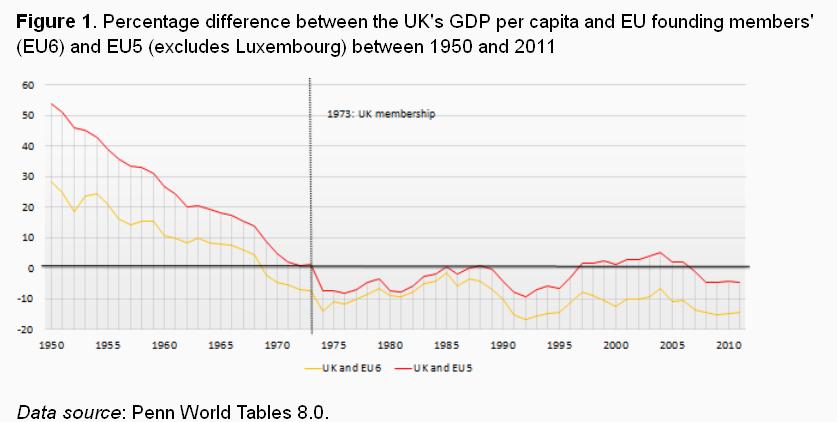Campos, F. N. & Coricelli, F. (2015) “Why did Britain join the EU? A new insight from economic history“, VoxEU Organisation, 03 Φεβρουαρίου.
Britain eschewed EU membership in the late 1950s but changed its mind in the early 1960s, only to be rebuffed by Charles de Gaulle. Membership came only in the early 1970s. This column argues that, among others, Britain joined the EU as a way to avoid its economic decline. The UK’s per capita GDP relative to the EU founding members’ declined steadily from 1945 to 1972. However, it was relatively stable between 1973 and 2010. This suggests substantial benefits from EU membership especially considering that, by sponsoring an overpowered integration model, Britain joined too late, at a bad moment in time, and at an avoidably larger cost.
Prime Minister Cameron is determined to change the relationship between the UK and the EU. If the Conservative party wins the May 2015 general election, he promised he will renegotiate membership terms and offer an ‘in or out’ referendum by the end of 2017 (Copsey and Naughton 2014). Life after the EU is a real option for the UK and an unfamiliar one for the EU, considering that no member has ever left. Economic history can throw valuable new light on the current re-examination of the rationale for membership.
This column argues that a fundamental yet relatively unappreciated feature of the relationship between Britain and the EU is a structural break.[1] The ratio of UK’s per capita GDP to the EU founding members’ declined steadily from 1945 until 1972 but was relatively stable between 1973 and 2010. Such prominent structural break (and to the best of our knowledge one not previously detected and analysed) suggests substantial benefits from EU membership especially considering that, by sponsoring an overpowered integration model, Britain joined too late, at a bad moment in time, and at an avoidably larger cost.
Σχετικές αναρτήσεις:
- Michael White, Larry Elliott & Charlotte Higgins: “What if Britain left the EU?“, The Guardian, 04 Νοεμβρίου 2014.
- Salamone, A. (2014) “Britain’s EU membership hangs by one less thread“, Britain’s Europe Blog, 27 Οκτωβρίου.
- Tavares, E. M. (2014) “A New Age Of IMF Bailouts – Great Britain In The 1970s“, ΘZeroHedge, 12 Οκτωβρίου.





